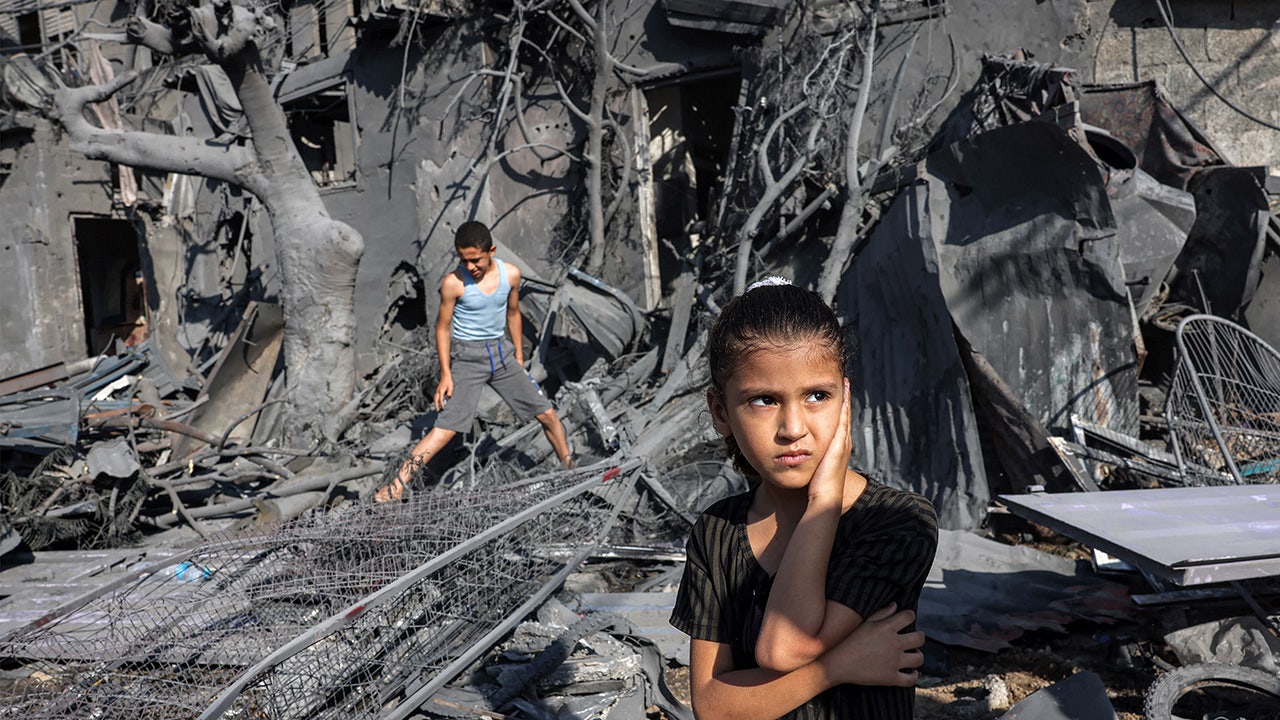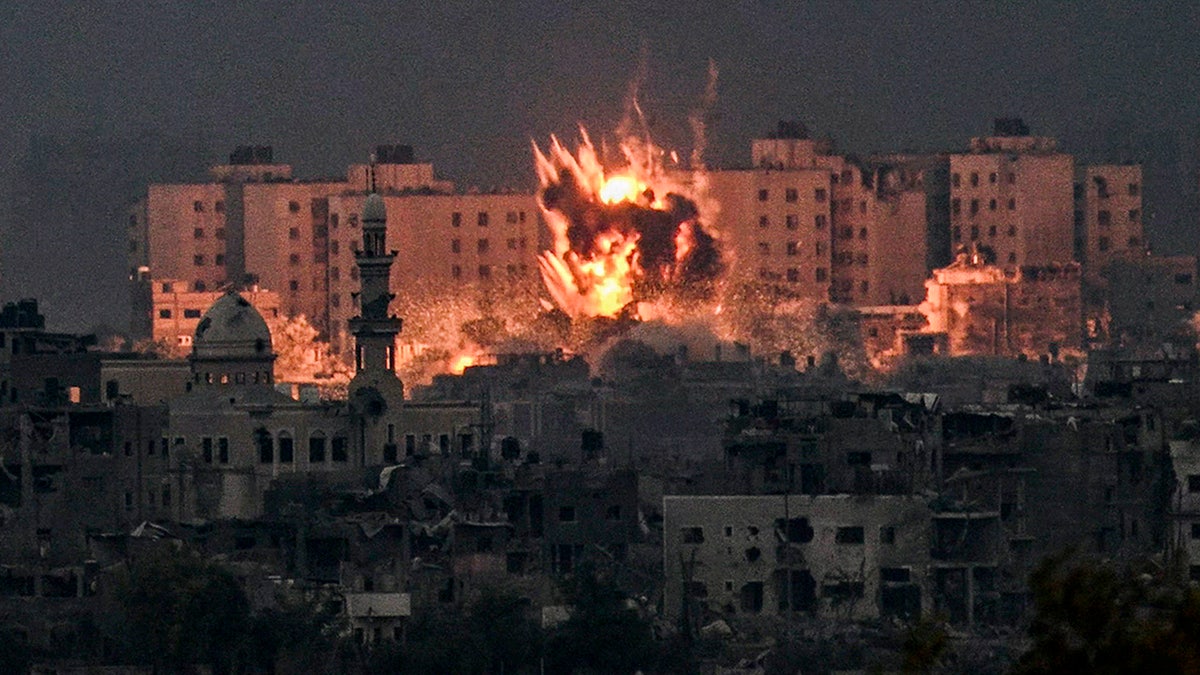World
Bloody red carpet: Assad returns to international stage with Arab League welcome

Syrian President Bashar Assad appeared at an Arab League summit in Saudi Arabia for the first time in more than a decade Friday after his country was expelled in 2011 for its brutal crackdown on peaceful pro-democracy protests during the Arab Spring.
Assad was welcomed back into the fold as part of a reintegration effort on behalf of several regional states, led largely in part by Saudi Arabia and the United Arab Emirates (UAE).
The Biden administration and top White House officials have condemned the move, vowing to continue its policy of keeping Syria an international pariah and continuing to hold Assad accountable for his role in the deaths of hundreds of thousands of Syrians in the country’s more than a decade-long civil war.
One Syria expert told Fox News Digital the Biden administration has been sending mixed messages on its Syria policy in the last several years. The Washington Post quoted a senior Biden administration official in October 2021 who said it did not support Jordan initiating normalization after King Abdullah II spoke with Assad via phone. However, the official said the Biden administration will no longer actively work to stop countries from engaging with Assad, except when the law specifically requires it.
Charles Lister, a senior fellow at the Middle East Institute, said the White House has been giving regional states a sort of yellow light to pursue normalization talks with Damascus while the State Department publicly holds a different position.
“The State Department has consistently been opposed to normalization and supportive of isolation, of sanctions, of punitive actions and what have you. But when you have a government, and particularly the most powerful government in the world, sending such mixed messages, it is no surprise that that has resulted in a completely useless, contradictory policy that ultimately has led us to where we are right now, which is some states in the region attempting to re-engage with the regime, but in so doing, unfortunately, from a U.S. perspective, as an American, they have completely destroyed our leverage,” he explained.
THE NUMBER OF REFUGEES FROM SYRIA TOPS 2 MILLION; NEARLY 5,000 A DAY FLEE ACROSS BORDERS
“If we ever were to choose to try to push Syria-related diplomacy, they’ve killed our leverage because ultimately Bashar al-Assad knows now that he has managed to coerce regional states into effectively capitulating to him. And so, if we as the United States were to ever step up and say, ‘Right, time to finally deal with the Syrian crisis, let us launch a major diplomatic process’ – the region has already stepped five steps down that ladder and given the regime a great deal more influence and leverage over that process than they had before.”
Crown Prince Mohammed bin Salman meets with Syria’s President Bashar Assad, in Jeddah, Saudi Arabia, May 19, 2023. (Syrian Presidency/Handout via Reuters)
The Arab League’s consensus decision to welcome the Syrian dictator back has felt like a slap in the face to Syrians forced to flee their homes due to barrel bombings from regime forces and shelling from Russian warplanes.
More than 14 million Syrians have been forced to flee their homes and nearly 7 million are internally displaced.
Khalid al-Shallah, a Syrian living in northwest Idlib province, told Fox News Digital, “We refuse normalization with the regime of Assad, and we cannot reconcile [and] have him as our president.” He added, “A criminal terrorist regime has displaced millions of Syrian families to different countries around the world and arrested hundreds of thousands in its prisons, and we do not know their fate.”
Al-Shallah and his family fled their home in Maarat al-Numan in 2019 due to constant shelling. He and his family were displaced for several years before moving into an apartment near the Turkey-Syria border.
He shared that despite the hunger and displacement his family experiences, they would rather continue to suffer than reconcile with the regime. “Bashar al-Assad is a war criminal, the killer of children, the biggest terrorist, the head of drug gangs. We are his people and we know him,” he said.
US HAS ENGAGED ‘DIRECTLY’ WITH SYRIAN OFFICIALS ABOUT FREEING AUSTIN TICE: STATE DEPARTMENT
The Saudi-led push for re-engagement with the Syrian regime has been described as conditional by Arab governments.
Lister told Fox News Digital that regional states such as Jordan and the UAE were largely inclined to push forward with normalization in an effort to get Syria to address issues they say are affecting their own countries.

Syria’s President Bashar Assad arrives in Jeddah, to attend the Arab League summit in Saudi Arabia, May 18, 2023. (Sana/Handout via Reuters)
For example, an end to drug trafficking, the facilitation of refugee returns to Syria, and the countering of corruption, extremism and terrorism inside the country.
Lister said that although the talks have come across as quid pro quo, there are no mechanisms in place to make sure Syria follows through. “None of the communiques, the written statements, the public statements given by officials, none of them have mentioned a single enforcement mechanism, no way to measure whether or not things are being either violated or conceded. And I think that tells us all that we need to know. This isn’t really a conditional engagement. This is just an engagement for engagement’s sake,” he explained.
AIRSTRIKES IN SOUTHERN SYRIA KILL ONE OF COUNTRY’S MOST WELL-KNOWN DRUG DEALERS
He added that Syria has a long track record of creating problems and then being able to control the scale of those problems as a “threat or a tool of coercion” against regional states.
Perhaps the biggest “tool of coercion” the regime possesses is its export of the drug Captagon. The senior fellow said one pill costs a cent to produce and can sell for $15 in the Gulf, proving to be an extremely lucrative business for the regime. In the last several weeks alone, Lister said, nearly $1 billion worth of Syrian-made Captagon has been seized in neighboring countries.

A customs officer displays Captagon pills, part $48 million worth of drugs confiscated in Sofia, Bulgaria, in 2007. (Reuters/Nikolay Doychinov)
“[Syria] has this history of sort of turning the tap up when it wants to turn the pressure up and then turning the tap down when it wants to curry some favor. And I think that’s probably – we are probably going to see some of that. I think they realize, the Syrian regime, that their biggest method of kind of a coercive influence over particularly Saudi Arabia, lies with the drugs trade,” Lister said. “And so I expect that… they may help, you know, leak information or intelligence to the Saudi government or to Jordan, on the southern border, about the identity, the location of certain shipments or certain individuals involved in the drugs trade to try to curry favor and show that it’s willing to turn that tap back down again and to give the likes of Saudi Arabia the perception that the Syrian regime is willing to play ball.”
A bipartisan group of U.S. lawmakers, led by Rep. Joe Wilson, R-S.C., introduced legislation to prohibit any federal government department or agency from recognizing or normalizing ties with the Assad regime. The Assad Regime Anti-Normalization Act of 2023 would also expand economic sanctions to those “involved in diverting and stealing humanitarian assistance meant for the people of Syria and those involved in stealing the property of the Syrian people for political reasons or personal gain.”

Rep. Joe Wilson speaks during a press conference on Capitol Hill, April 25, 2023. (Reuters/Julia Nikhinson)
US HAS ENGAGED ‘DIRECTLY’ WITH SYRIAN OFFICIALS ABOUT FREEING AUSTIN TICE: STATE DEPARTMENT
Wilson told Fox News Digital in a statement that normalization with Assad will be met with consequences. “We appreciate our partners and allies in the Gulf and broader Arab world, but the Arab League should be on notice. Normalization with mass murderer Assad is not the right path forward and as this bipartisan bill illustrates, such actions will be met with consequences. I’m grateful to Chairman Mike McCaul for his support and rapidly moving this legislation forward,” he said.
The bill was unanimously passed by the House Foreign Affairs Subcommittee on the Middle East, North Africa, and Central Asia last week.

World
The Other Black Girl Cancelled at Hulu

ad
World
State Department criticizes Israel’s attempts at ‘mitigating civilian harm’ in Gaza war: report

The U.S. State Department on Friday criticized Israel’s use of U.S-supplied arms in a way that may be “inconsistent” in “mitigating civilian harm” in the war in Gaza.
A report obtained by Fox News Digital, which was sent to Congress on Friday, admitted that “Israel has had to confront an extraordinary military challenge: Hamas has embedded itself deliberately within and underneath the civilian population to use civilians as human shields.”
The report added that “it is often difficult to determine facts on the ground in an active war zone of this nature and the presence of legitimate military targets across Gaza.”
Nearly 35,000 Palestinians have been killed in the conflict, including many women and children, according to the Palestinian government.
HAMAS KINGPIN HOLED UP DEEP BELOW GAZA, SURROUNDED BY HOSTAGES USED AS HUMAN SHIELDS, SAYS EXPERT
A girl looks on as she stands by the rubble outside a building that was hit by Israeli bombardment in Rafah in the southern Gaza Strip, Oct. 31, 2023. (Mohammed Abed/AFP via Getty Images)
The report was commissioned by President Biden to assess if Israel and other U.S. allies are adhering to international humanitarian law.
Israeli officials have said the country is complying with international law “and have identified a number of processes for ensuring compliance that are embedded at all levels of their military decision-making,” the report said, including giving advanced warnings, using specific weapons and avoiding places like schools, hospitals and places of worship.
“Although we have gained some insight into Israel’s procedures and rules, we do not have complete information to verify whether” U.S. arms “were specifically used in actions that have been alleged as violations of [international humanitarian law] or international human rights law during the period of the report,” the report continued. “The nature of the conflict in Gaza makes it difficult to assess or reach conclusive findings on individual incidents.”

A fireball erupts during Israeli bombardment in the northern Gaza Strip, Oct. 14, 2023. (Aris Messinis/AFP via Getty Images)
It said, however, that the United Nations, humanitarian organizations and international humanitarian law experts “have reported Israeli civilian harm mitigation efforts as inconsistent, ineffective, and inadequate, failing to provide protection to vulnerable civilians who cannot or chose not to relocate.”
BIDEN VOWS TO WITHHOLD WEAPONS FROM ISRAEL IF NETANYAHU GOES FORWARD WITH RAFAH INVASION
Israel has the capability, experience and tools to mitigate civilian harm, the report said, adding, however, “the results on the ground, including high levels of civilian casualties, raise substantial questions as to whether the IDF is using them effectively in all cases.”

President Biden speaking with Israeli Prime Minister Benjamin Netanyahu in Tel Aviv last October. (Brendan Smialowski/AFP via Getty Images)
Despite misgivings, the State Department said it found Israel’s assurances that it had followed international law in the use of U.S. weapons “credible and reliable” and will continue supplying arms.
World
US report punts on possible Israeli violations of international law in Gaza

A report from the administration of President Joe Biden has found that Israeli forces likely used United States-supplied weapons in a manner “inconsistent” with international law, but it stopped short of identifying violations that would put an end to the ongoing military aid.
In the report, released on Friday after a delay, the US State Department indicated Israel did not provide adequate information to verify whether US weapons were used in possible violations of international law during its war in Gaza.
The Biden White House had issued a national security memorandum, NSM-20, in February requiring Israel and other countries receiving military aid to provide written assurances that all US-supplied weapons were used in a manner consistent with international law.
The US would then make a decision about future military aid based on those written assurances. Friday’s report is a byproduct of that memorandum.
“It is reasonable to assess that defense articles covered under NSM-20 have been used by Israeli security forces since October 7 in instances inconsistent with its IHL [international humanitarian law] obligations or with established best practices for mitigating civilian harm,” the report said.
The report nevertheless adds that the Biden administration believes Israel is taking “appropriate steps” to address such concerns.
Political backlash
The US has been a consistent ally to Israel throughout its seven-month-long military campaign in Gaza, which began on October 7.
That war, however, has spurred international outcry as humanitarian concerns mount.
Nearly 35,000 Palestinians have been killed in Gaza, many of them women and children, and the head of the United Nations World Food Programme has declared a “full-blown famine” in the northern part of the narrow enclave.
Still, Israel’s siege on Gaza continues, with access to food, water and electricity severely limited. UN experts have repeatedly warned of a “risk of genocide” in the territory.
As a result, the Biden administration has faced pressure, particularly from the progressive flank of the Democratic Party, to address the humanitarian concerns by placing conditions on military aid to Israel.
After the report’s release on Friday, progressive lawmakers expressed disappointment with its conclusions.
Senator Chris Van Hollen, for instance, stated it “fails to do the hard work of making an assessment and ducks the ultimate questions that the report was designed to determine”.
Meanwhile, Republicans blasted the report as undermining Israel in its campaign against the Palestinian group Hamas.
Senator Jim Risch, for instance, called the document “politically damaging” and said it would do long-term harm to US allies beyond Israel.
“NSM-20 is aimed squarely at Israel in the near-term, but the additional highly-politicized reporting requirements will eventually be aimed at other American allies and partners across the globe, further impeding the delivery of security assistance and undermining our ability to deter China and Russia,” he wrote in a statement.
Impediments to the report
Friday’s report acknowledges limits to the US State Department’s findings, pointing out that the information that Israel provided was not comprehensive.
“Although we have gained insight into Israel’s procedures and rules, we do not have complete information on how these processes are implemented,” the report reads.
It also said the war itself creates barriers to understanding what is happening on the ground.
“It is difficult to assess or reach conclusive findings on individual incidents” in Gaza, the report said, citing a lack of US government personnel on the ground.
It also echoed Israeli accusations that Hamas could be manipulating civilian casualties for its own gains.
Gaza, the report said, represents “as difficult a battlespace as any military has faced in modern warfare”.
Tracing the flow of aid
The report also sought to assess whether Israel was impeding the flow of aid into Gaza, another possible violation of international humanitarian law, as well as US law.
It found “numerous instances during the period of Israeli actions that delayed or had a negative effect on the delivery of aid to Gaza”.
Nevertheless, the report concluded that it could not assess that the “Israeli government is prohibiting or otherwise restricting the transport or delivery of US humanitarian assistance within the meaning of section 620I of the Foreign Assistance Act”.
Humanitarian groups, however, have reported for months that Israel systematically blocks large portions of aid from entering the Gaza Strip.
Overall, the report said that US intelligence agencies have “no direct indication of Israel intentionally targeting civilians”, but they assessed that “Israel could do more to avoid civilian harm”.
In addition, the State Department pledged to continue to monitor the situation in Gaza, particularly with regards to the delivery of aid.
“This is an ongoing assessment and we will continue to monitor and respond to any challenges to the delivery of aid to Palestinian civilians in Gaza moving forward.”
-

 Politics1 week ago
Politics1 week agoThe White House has a new curator. Donna Hayashi Smith is the first Asian American to hold the post
-

 News1 week ago
News1 week agoPolice enter UCLA anti-war encampment; Arizona repeals Civil War-era abortion ban
-

 Politics1 week ago
Politics1 week agoAdams, NYPD cite 'global' effort to 'radicalize young people' after 300 arrested at Columbia, CUNY
-

 World1 week ago
World1 week agoTurkish police arrest hundreds at Istanbul May Day protests
-

 News1 week ago
News1 week agoVideo: Police Arrest Columbia Protesters Occupying Hamilton Hall
-
)
) Movie Reviews1 week ago
Movie Reviews1 week agoThe Idea of You Movie Review: Anne Hathaway’s honest performance makes the film stand out in a not so formulaic rom-com
-

 News1 week ago
News1 week agoSome Republicans expected to join Arizona Democrats to pass repeal of 1864 abortion ban
-

 Politics1 week ago
Politics1 week agoNewsom, state officials silent on anti-Israel protests at UCLA














